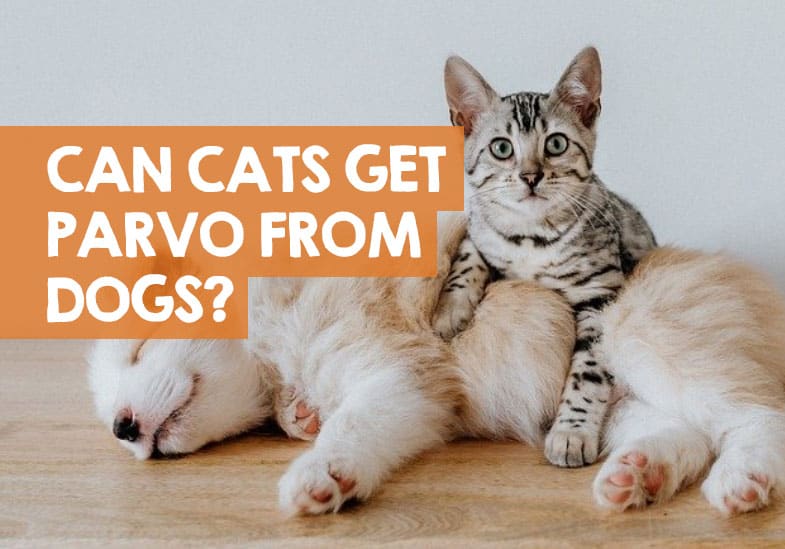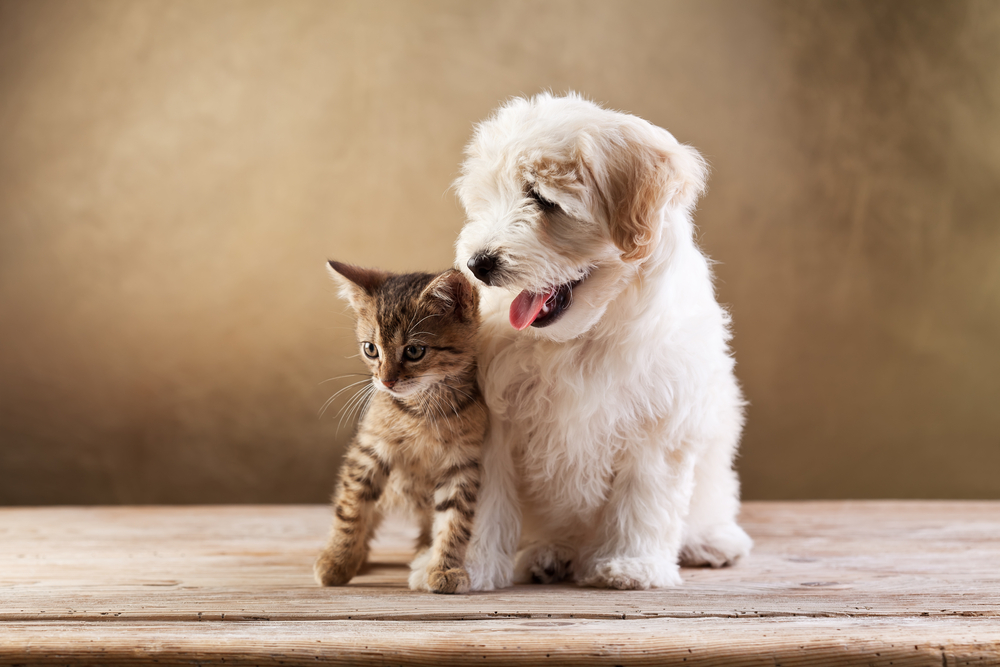However there are some studies that have shown that a mutated strain of the canine parvovirus CPV can in fact infect cats. Parvo or canine parvovirus CPV infection is a relatively new disease that appeared for the first time in dogs in 1978.

Can Cats Get Parvo From Dogs Contagious Research Results
Canine parvovirus CPV and feline panleukopaenia virus FPLV are two closely related viruses which are known to cause severe disease in younger unvaccinated animals.

. Fluid therapy and nursing care is the cornerstone of treatment for infected cats. Cats get feline parvovirus but we call it feline panleukopenia FPL. Can cats get parvo from dogs.
Wildlife species that can be infected with parvoviruses include coyotes wolves foxes raccoons minks and bobcats. Parvoviruses are capable of infecting and causing disease in carnivores and are found worldwide. The virus can also be transmitted by dogs.
Transmission Parvovirus can infect unvaccinated dogs of any age but commonly affects. Canine parvovirus often infects other mammals including foxes wolves cats. We reviewed the evolution of carnivore parvoviruses with particular reference to Canine parvovirus CPV infection in cats.
The virus is hearty and can live on an infected dog on a persons shoe on a rug in a contaminated lawn in a snow pile in a kennel carrier on a dog bed at a. Parvoviruses are very hardy and can survive for months in cool moist conditions protected from sunlight and remain. Several attempts were made to.
Feline parvovirus FPV is a highly contagious pathogen of cats. Treatment often involves veterinary hospitalization. Clinical disease In kittens over three or four weeks of age and in adult cats the virus causes a very severe gastroenteritis following an incubation period of five to nine days.
Every shelter is at high risk for exposure to feline and canine parvoviruses and most have been affected by outbreaks of feline panleukopenia or canine parvovirus. Canine parvovirus is a highly contagious and dangerous virus that affects primarily young unvaccinated dogs. These parvoviruses molecular and phenotypic evolutionary pattern.
In 2000 a new antigenic variant CPV-2c was. Canine parvovirus is a contagious virus mainly affecting dogs. Because of the severity of the disease and its rapid spread through the canine population CPV has aroused a great deal of public interest.
Adult cats can also get the feline parvovirus. Yes cats can get parvo from dogs. Since other diseases mimic parvo and panleuk diagnostic testing should be performed on all dogs and cats with compatible clinical signs instead of making a decision on a guess especially if.
Since the emergence of Canine parvovirusCPV-2 in the late 1970s CPV-2 has evolved consecutively new antigenic types CPV-2a and 2b. The specific virus that infects dogs does not infect cats so cats cant get feline parvo from dogs. The virus that causes this disease is very similar to feline panleukopenia feline distemper and the two diseases are.
Parvoviruses are capable of infecting and causing disease in carnivores and are found worldwide. When canine parvovirus CPV first appeared in 1985 there was no vaccine for it. This potentially fatal infection which typically affects young unvaccinated or inadequately vaccinated puppies is a major problem and.
Cats infected with FPV can continue to excrete the virus for at least six weeks following infection and the virus can also be transmitted by dogs. Parvoviruses can also infect domestic cats and dogs. Yes cats can catch this disease from dogs depending on the strain they are exposed to.
CPV probably arose as the result of 2 or 3 genetic mutations in FPV that allowed it to expand its host range to infect dogs. Vaccines can prevent this infection but mortality can reach 91 in untreated cases. Can Dogs Get Parvo From Cow Poop.
But dogs do get infected by a similar virus called the canine parvovirus-2 CPV-2. Therefore parvovirus infection cannot be diagnosed based on the age of the dog or cat and the clinical signs. So while it is uncommon yes cats can get parvovirus from dogs.
Although many details about specific host-parasite systems have been reported our understanding of host range alteration and the evolution of virulence remains rudimentary. Parvoviruses are VERY HARDY and can survive for months in cool moist conditions protected from sunlight and. CPV is closely related to feline panleukopenia virus FPV a virus that has been know since the 1920s to infect cats and mink and other animals.
Soon after its emergence CPV-2 underwent genetic evolution giving rise consecutively to two antigenic variants CPV-2a and CPV-2b that replaced progressively the original type. An interesting and frankly somewhat scary report in an upcoming issue of Veterinary Microbiology Clegg et al 2012 provides further information suggesting that cats might be a source of canine parvovirus infection. Although CPV-2 did not have a feline host range CPV-2a and 2b appear to have gained the ability to replicate in cats.
Also dogs and cats cannot get parvovirus B19 from an infected person. As well as causing disease in their respective hosts CPV has recently acquired the feline host range allowing it to infect both cats and dogs. Recent investigations demonstrate the prevalence of CPV-2a and 2b infection in a wide range of cat populations.
They most often have much more mild clinical signs than dogs do but there is a strain of canine parvovirus that can cause severe illness in cats. It is also known as feline panleukopenia virus and feline infectious enteritis. Feline parvovirus panleukopenia virus and canine parvovirus are highly contagious viral diseases that commonly cause serious illness in cats and dogs in animal shelters.
FPV can be seen in any age of cat but infection is most common in kittens and adolescent. Canine parvovirus type 2 CPV-2 emerged in late 1970s causing severe epizootics in kennels and dog shelters worldwide. Wildlife species that can be infected with parvoviruses include coyotes wolves foxes raccoons minks and bobcats.
For example if a parvo outbreak in an animal shelter takes. CPV is highly contagious and is spread from dog to dog by direct or indirect contact with their feces. While dogs cant get parvo from cats a cat can get infected with parvo from a dog.
However there are some studies that have shown that a mutated strain of the canine parvovirus CPV can in fact infect cats. 7 rows 2 doses 3-4 weeks apart. The virus causes life-threatening vomiting diarrhea and dehydration.
So now you know the facts about canine parvovirus and the parvo vaccine. Symptoms of Parvo in Cats include. The parvovirus virus is an immune system-specific virus that is why dogs.
However whilst we now know cats can get canine parvovirus in addition to the more common feline panleukopenia virus FPV cannot be passed to dogs from cats. Vaccination is crucial to minimize the spread and exposure to our canine companions. While dogs cannot get feline parvovirus from cats cats can become infected with canine parvovirus.
Parvoviruses can also infect domestic cats and dogs.

Can Cats Get Parvovirus From Dogs Canna Pet

Feline Panleukopenia Virus Canine Parvovirus
Feline Parvovirus Infection Recognition Treatment And Prevention In The Shelter International Cat Care
0 Comments